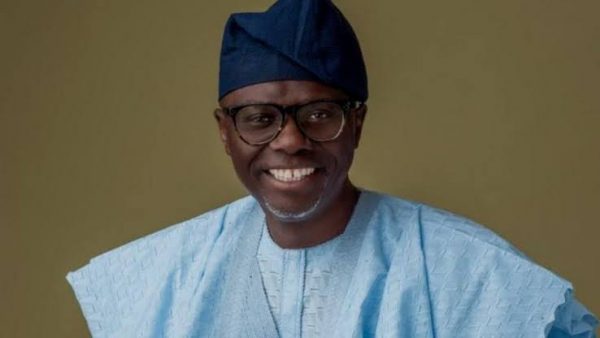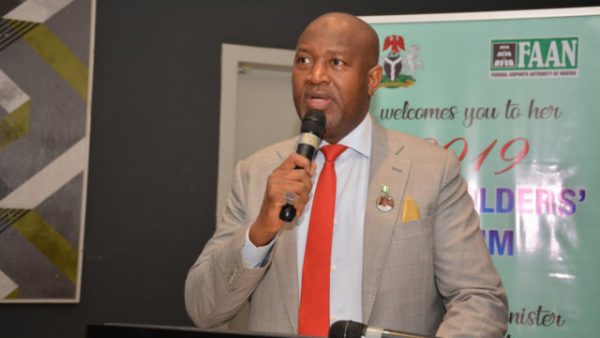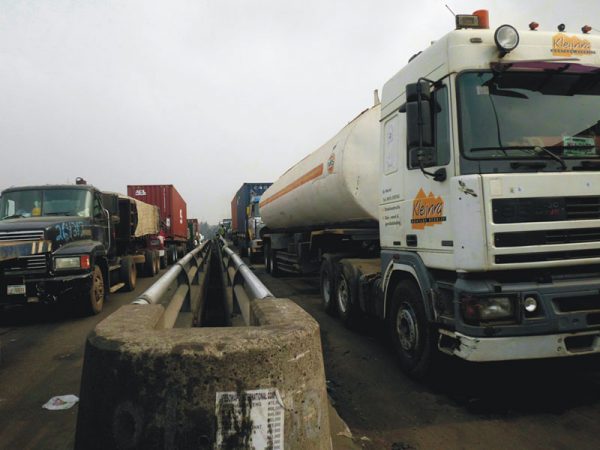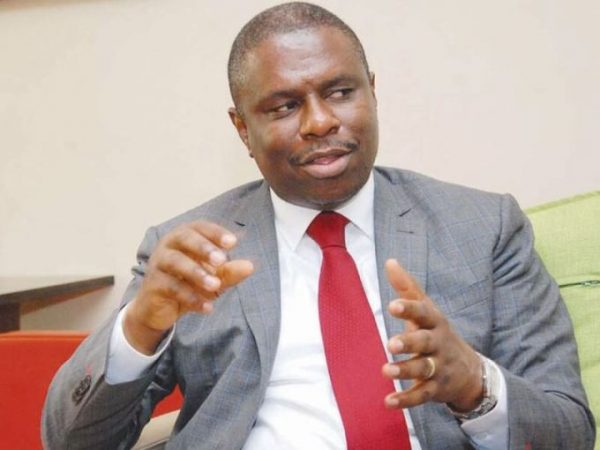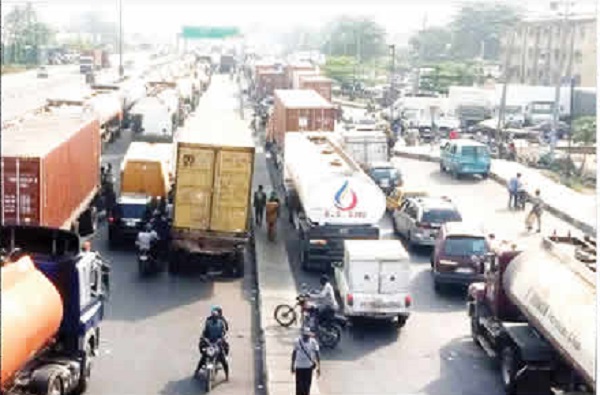‘Beggars’ On Rampage In NIMASA, Workers Die In Pains
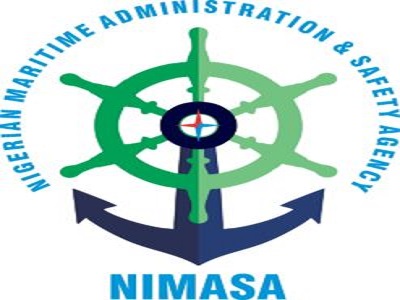 *Management Lobbies Senate On Crude Affreightment
*Management Lobbies Senate On Crude Affreightment
In what has lately become a systemic hubris, the workers of Nigerian Maritime Administration and Safety Agency (NIMASA) have turned beggars in the agency and are constantly on rampage over the failure of the management to adequately meet their financial needs in terms of salaries and allowances.
As a result, many of them resort to compelling contractors to part with some money as condition to process their documents for payment or contract awards.
Meanwhile, in a bid to curb the myriad of challenges facing indigenous maritime operators in crude affreightment, NIMASA has started lobbying the Senate to develop laws to enforce the carriage of the nation’s oil via Cost, Insurance and Freight (CIF) rather than Free on Board (FOB) basis.
However, alarmed at this, the management in a memo dated July 20, 2017 titled: “Attitude to work” and signed by Mr. Akinyosoye Akin, warned members of staff to desist from demanding financial gratification from contractors to enable them process documents.
The memo reads: “Management has received with dismay complaints from the Agency’s contractors that staff of some department and units demand financial gratification to enable processing of contract documents, thereby prolonging turnaround time and overall deliverables and ultimately impact on the image of the Agency contrary to the spirit of the recent rebranding.
“Management views this act as an act unacceptable of officers of the Agency which contravenes chapter 3 Section 4 of the Public Service Rules and section 4.4.2 of the Agency’s Anti-Corruption Policy.” It stated.
However, warning members of staff of the consequences of being caught which is disciplinary action in line with the extant rules; workers have rationalized their action with their denial of their allowances which has claimed lives of colleagues as well as the contracting of virtually everything in the agency.
One of the aggrieved members of staff reacted thus: “Why is Dakuku complaining? The solution here is to also contract the processing of documents so that there would not be any interface between the contractors and staff. The security men at the exit and entry gates, are they NIMASA staff? Watch and see what happens there as you enter or exit!”
On assumption of duty in NIMASA, the Director General, Dr. Dakuku Peterside suspended the workers’ allowances upon which many of them had used to access credit facilities from banks. According to the workers, his reason was that the allowances were not approved by the Salaries and Wages Commission.
But it was gathered that the workers’ allowances in any agency is not subject to the approval of the Salaries and Wages Commission because allowances are programmed and dispensed according to the revenue generating powers of the agency. Only salaries are statutorily approved by the commission.
Following the massive loan liabilities already incurred by the workers with the hope of paying with from the allowances accruals, many workers now use their salaries to service loans thereby rendering them financially empty every month end.
MMS Plus gathered that some who collected huge sum of money skip salary collection every two months on the orders of the banks to ensure that the facility is repaid. This has left many in pains, especially when the management of the agency had approved and guaranteed the collection of the facilities by the workers.
The Director General of the NIMASA, who was represented by Mr. Anthony Ogadi, Head, Shipping Development, revealed this during his goodwill message at the 2nd edition of the Taiwo Afolabi Annual Maritime Conference which held on Friday, last week.
CIF and FOB are international shipping agreements used in the transportation of goods between a buyer and a seller. The specific definitions are different for every country, but CIF and FOB have similar uses but they differ in who assumes responsibility for the goods during transit.
In CIF agreements, insurance and other costs are assumed by the seller, with liability and costs associated with successful transit paid by the seller up until the goods are received by the buyer, while FOB contracts relieve the seller of the responsibility once the goods are shipped. Once goods have passed the ship’s rail, they are considered to be delivered into the control of the buyer.
One of the problems associated with the FOB for crude oil dealers is that their counterparts in foreign countries are dubious sometimes and they could deny the quality agreed for the product when it reaches the destination. At such times, the seller could be forced to sell the item at any price in order to avoid incurring demurrages and also recoup the money invested in the journey. Most times, under this FOB the Nigerian oil dealer also pays for the inspection which is done overseas where the quality and quantity of the product is assessed.
The Chairperson at the Taiwo Afolabi event, Barr. (Mrs.) Margaret Orakwusi also lamented that FOB business was obsolete and called for the younger generation to take the maritime stage with innovation in policies, laws and infrastructure that would enhance the speedy growth of the maritime industry in Nigeria.
It should be recalled that shortly after his appointment as the Director General of the Nigerian Maritime Administration and Safety Agency (NIMASA), Dr. Dakuku Peterside called for a change in policy from FOB to CIF in order to maximize the potentials of the Cabotage regime.
However, POF and CIF are seen as international systems of trade and they cannot be confined to the Nigerian Cabotage and NIMASA has not stated how it intends to lobby the Senate on an issue that affects the ease of doing business in the nation. Shouldn’t the agency be more strategic in a bid to get a presidential order for CIF to be prevalent?
Meanwhile, in the keynote address at the event, the Executive Director Sifax Haulage & Logistics Company Limited, Major Henry Ajetunmobi lamented that “it is challenging enough that Nigeria has neglected the wisdom in intermodalism when it chooses to focus majorly on just one mode of transport (road), to the near total neglect of the other two vital modes-rails and barges. The current bad state of port access roads, especially to the two ports in Lagos, Apapa and Tincan – the ports that receive over 70 percent of the total cargo throughput in Nigeria – is a rather sad commentary on the way we have fared as a nation even on the one transport mode we appear to have chosen.
“As it is well known, the negative consequences of this development are not just telling on the economy and the state of equipment; they also impact adversely on human health both of port users, operators, and residents of the host communities themselves. This is one area that would benefit from decisive PPP – driven investment intervention. Perhaps the time is now right to start considering adoption of other options and models of maintaining and improving upon the quality of our port access roads, including concessioning through tolling. Or perhaps we should strive for bolder and more ambitious option. This may be by proposing that within a given span of time, short rail lines should be constructed to somewhere between Lagos and Ibadan, and another to a location between Abeokuta and Ibadan to which all cargoes arriving Lagos ports will be evacuated by rail before delivery to shippers and their agents” Ajetunmobi said.
The Vice Chairman, SIFAX Group, Dr. Taiwo Afolabi highlighted the huge infrastructural deficit as the major factor that has impeded the maritime sector from fulfilling its potentials. “Deplorable access roads, faulty cargo scanners, non-existent rail system, non-functional truck bay, among others, have conspired to negatively impact the service delivery efficiency and overall impact. This challenge is the major reason we are all gathered here this morning in order to address it. The Nigerian maritime sector cannot continue to reel under the burden of infrastructural decay if we want to contribute meaningfully to the economy and fulfill the industry’s potentials”.
However, the SIFAX boss also commended the commitment of the Federal Government to reforms in the maritime industry, especially the recent executive order signed by the Acting President, Prof. Yemi Osinbajo.
According to him, this is an acknowledgement of the fact that things must be done differently. However, he opined that infrastructural deficit would negate the good intentions of the government if the problem is not strategically and urgently addressed.



